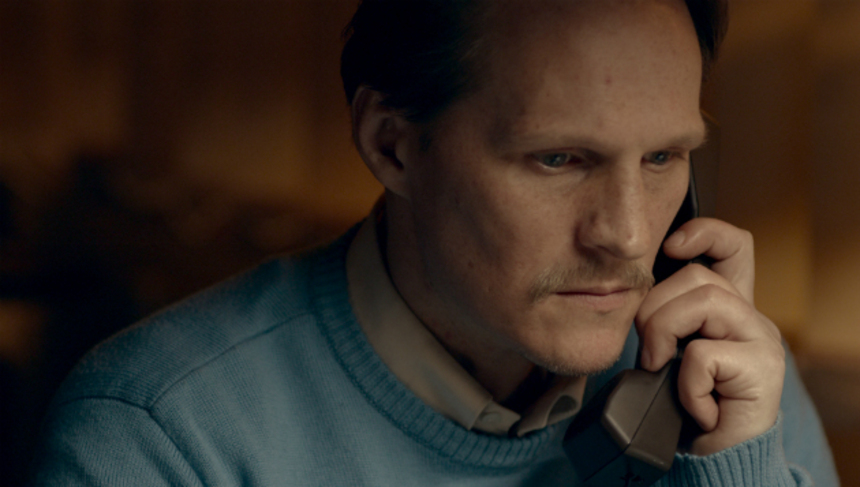Berlinale 2016 Review: ALOYS Exhalts In Glorious Madness

Right from the moment the very first frame leaves the projector, you know that you're going to be in for a bizarre ride. The sound links up with the image of a kitchen-sink tap flowing at full pelt, and to your right four hobs burn brightly without any pans or people in sight. The camera then takes a step back, and a wide open bare fridge to your left completes the picture. Just as abruptly we abandon this scene and embark on a tour of the house, finding there nothing but empty rooms and a camera lying mysteriously in the corner of one of the bedrooms.
The scene's unfamiliar symmetries are as beautiful as they are absurd, and immediately a sensation of sinister surveillance takes over. Far from being clear what significance these shots have to do with anything in particular either, we then move to what appears to be a funeral in a Spartan crematorium. Here we discover the eponymous Aloys, a moustachioed, German-speaking man holding the same talismanic video camera as before.
It is slowly revealed that the man in the coffin is his father, and this rattled investigator documents the scene, is hostile to those around him and then abruptly leaves, creating a pretty clear-cut portrait of his personality. He shuns the company of others in favour of returning home where he can watch the clips he has captured during the day. We observe him in these private scenes with a similar voyeurism, and it almost seems as if he were trying to replay the fleeting moments which brought him happiness.
His magnificent foibles all seem to slightly whiff of a need for control, and this is brilliantly mirrored in the film's carefully staged techniques. Every scene seems to have a strictly off-centre symmetry about them and their studiously beige and brown colour schemes also seem rigorously oppressive. You can also very much hear Aloys' strict self-isolation in this great technique Nölle uses of cutting audio tracks every time a door shuts. In these instances, it is always as if the character is creating some kind of sanitising barrier against the outside world.
And yet his world is also brilliantly shown to be an unpleasantly claustrophobic and cloying environment, thanks to this excellent motif of condensed windows which seems to persist throughout. What's more, the director paints this pressurised bubble as if it were some kind of ultimate expression of the Swiss spirit, and Aloys' same melancholic need for control does seem to flood into the carefully selected, non-descript town that the film takes for its setting.
Unfathomably suburban, the striking 1960s high-rise in which Aloys lives has all the architectural symmetry of a white and grey Mondrian painting, and the director also crafts his location into an incredible time capsule. Filled with these faded '70s colour schemes and an eclectic collection of low-fi technology (probably from the director's formative years), the walk-man and the VHS player is never far from your nostalgic reach in this film, and the pleasing consequence is that things become much more tactile and tangible.
You can really hear Aloys' incessant pausing, rewinding and stopping in this film, and this camcorder aesthetic really winds its way into the way the film behaves. It jumps, replays and pauses throughout, and this causes a delicious blend between retro tech and reality as we move into an increasing number of dream-like scenes. In fact, in this respect, this movie isn't that far from being up there with the likes of Eternal Sunshine of the Spotless Mind.
What is also rather fantastic is the way that the film's off-kilter humour initially feels so unmistakably Scandinavian, like it were some kind of homage to Roy Andersson. But before long Aloys scrambles down the rabbit hole, and it comes out into a world which feels decidedly like the illegitimate love child of Richard Ayoade's The Double mixed with the films of Michel Gondry. Except Nölle's Panorama entry doesn't fit specifically into any of those other moulds either, and instead it produces something which is very much its own beast.
This captivating process of stylistic bastardisation very much begins when the shoe (or in Aloys' case a weird, dated slipper for indoor use only) is placed on the other foot by a mysterious woman called Vera, who steals Aloys' camera and films him on it whilst he's drunkenly incapacitated. What follows next is something between a hostage situation and a Stockholm-syndrome love affair, and the woman slowly begins to turn the tables on the investigator with a series of prying phone calls.
She forcefully begins to introduce Aloys to an obscure Japanese invention: the "telephone walk." Originally suggested by a psychologist as a fantastically eccentric method to rehabilitate lonely recluses by taking them on imaginary walks over the phone, the intimacy two characters cook up in these scenes is delightful. In time, these mental preambles also plant not so much a seed of change in Aloys' psyche, but rather an entire forest, causing both of them to get lost in a maze of neuroses.
Filled with a constantly captivating dreamy or alternative comedy kind of vibe, this film's unusual approach draws some really top-notch voice acting from newbie Tilde von Overbeck, and it equally becomes a very potent piece about loneliness and the need for human connections. In terms of the artistic, Kaufman-esque look Aloys takes at madness and the joyful intimacy that fantasy can create this film is also really a very wonderful piece and it comes highly recommended.
Aloys
Director(s)
- Tobias Nölle
Writer(s)
- Tobias Nölle
Cast
- Georg Friedrich
- Tilde von Overbeck
- Kamil Krejcí
- Yufei Li

Do you feel this content is inappropriate or infringes upon your rights? Click here to report it, or see our DMCA policy.






